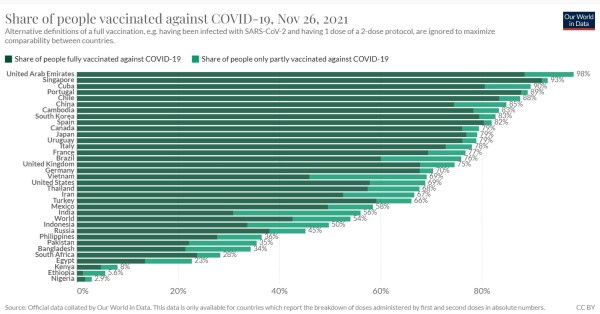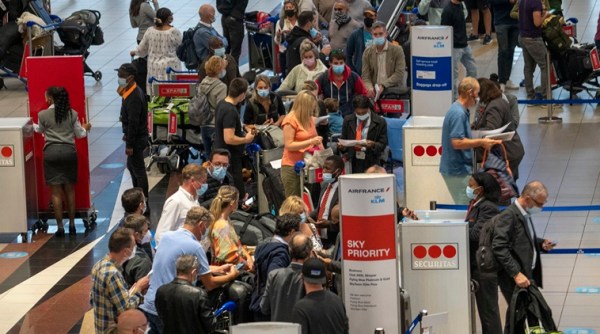
With the Omicron variant of Covid-19, which was first identified in South Africa, being identified by the World Health Organisation (WHO) as a variant of concern, the focus has once again shifted to low vaccination rates in developing countries.
The WHO had asked every country to vaccinate at least 10% of their population by September. More than 50 countries have missed this target—most of these are in Africa, a continent where only 7% of the people are fully vaccinated, compared to 42% of the global population, according to Our World in Data, which is an Oxford University-based project.
In fact, only 15 African countries met the 10% target by September, and half of the countries have vaccinated less than 2% of their population. Two countries—Burundi and Eritrea—are yet to roll out their vaccination programme.
Low vaccination coverage among healthcare workers
Even among healthcare workers, the vaccination rates are abysmally low. Only 27% of health workers in Africa have been fully vaccinated, an analysis by WHO states. Analysis of the data further showed that since March 2021, 1.3 million health workers were fully vaccinated in 25 countries. Among them, the number was more than 90% in just six countries and less than 40% in nine countries. In sharp contrast, WHO data shows that more than 80% of healthcare workers have been vaccinated in high-income countries.
“The majority of Africa’s health workers are still missing out on vaccines and remain dangerously exposed to severe COVID-19 infection. Unless our doctors, nurses and other frontline workers get full protection we risk a blowback in the efforts to curb this disease. We must ensure our health facilities are safe working environments,” Dr Matshidiso Moeti, WHO Regional Director for Africa, was quoted as saying according to a press release.
Things are particularly bad in South Africa where Covid-19 has claimed around 89,000 lives in the past few months—the most number of deaths due to the virus in the continent. According to Our World in Data, about 28% of people in South Africa are vaccinated against Covid-19, and 24% have received both shots. This shows how big the gap is with developed countries as far as vaccination figures are concerned—the share of people who have been fully vaccinated are 75% in Belgium, 62% in Israel and 60% in Hong Kong.
 Percentage of people vaccinated in each country (Source: Our World in Data)
Percentage of people vaccinated in each country (Source: Our World in Data)
Other than South Africa, the vaccination numbers in most African countries are low—the share of people fully vaccinated are 27% in Lesotho, 18% in Zimbabwe, 21% in Eswatini, 11% in Mozambique and Namibia, and just 3% in Malawai.
Reason behind low vaccination numbers
Africa relied on bilateral deals, donations and the Covax scheme for their vaccination programmes. Promises were made at the G7 summit and UN General Assembly meeting to donate vaccine doses to African states.
But out of the billion vaccine doses that countries had promised to donate to African states, less than 15% have been delivered, an analysis by Airfinity has found. The analysis, which considered the available supply of vaccines in the US, UK, EU, Canada and Japan, found that potentially 1.2 billion vaccine doses by the end of the year will be available for redistribution, out of which most have not been earmarked for donation yet.
 People line up to get on an overseas flight at OR Tambo International Airport in Johannesburg, South Africa (AP)
People line up to get on an overseas flight at OR Tambo International Airport in Johannesburg, South Africa (AP)
While wealthier countries had signed deals with vaccine manufacturers as early as July 2020, most African states remained dependent on donations.
African states were also heavily reliant on the Covax scheme for which they depended on vaccines from Serum Institute of India. But as India halted vaccine exports while the country was going through the second wave of the pandemic, supplies were hit, leading to shortage in vaccine supplies through Covax.
While WHO aims to vaccinate 40% of the world’s population to be fully vaccinated by the end of 2021, the current rate suggests that target will be met in Africa only by March 2022. WHO had initially proposed to deliver 620 million doses to Africa, but it has now revised the target to 470 million. That will be enough to fully vaccinate only 17% of Africa’s population.
Low vaccination rates and emerging variants
Inequalities leading to low vaccination coverage in certain countries gives the virus more hosts to infect and more time to mutate. It effectively means that sets the ground for more potentially dangerous mutant variants to emerge which can evade immunity offered by vaccines and led to a fresh spurt in infections.
“Escaping from immunity is something that viruses do really well. If there are lots of populations that are still susceptible, we’re in the same kind of hamster wheel of this that we’ve been in before,” Ian Mackay, an associate professor of virology at the University of Queensland, told Bloomberg.
Speaking on the Omicron variant, Maria Van Kerkohove, Covid-19 Technical Lead at WHO, has said in a statement: “This variant has been detected and reported to us by our colleagues in South Africa. There are fewer than 100 whole-genome sequences that are available. We do not know very much about this yet. What we do know is that his variant has a large number of mutations. And the concern is that when you have so many mutations, it can have an impact on how the virus behaves.”
While not everything is understood about Omicron yet, scientists have said that it carries a cluster of mutations which are seen in other variants of concern and are associated with enhanced transmissibility.
Even as the Network for Genomics Surveillance in South Africa has said it will continue to monitor the virus closely for tracing emerging variants which may be potentially dangerous, the conversation has once again shifted to how vaccine inequity is a stumbling block to the global quest to recover from the pandemic.
“Vaccine inequity is the world’s biggest obstacle to ending this pandemic and recovering from Covid-19,” Dr Tedros Adhanom Ghebreyesus, Director-General of the World Health Organization, was recently quoted as saying in a WHO press release. “Economically, epidemiologically and morally, it is in all countries’ best interest to use the latest available data to make lifesaving vaccines available to all,” he added.